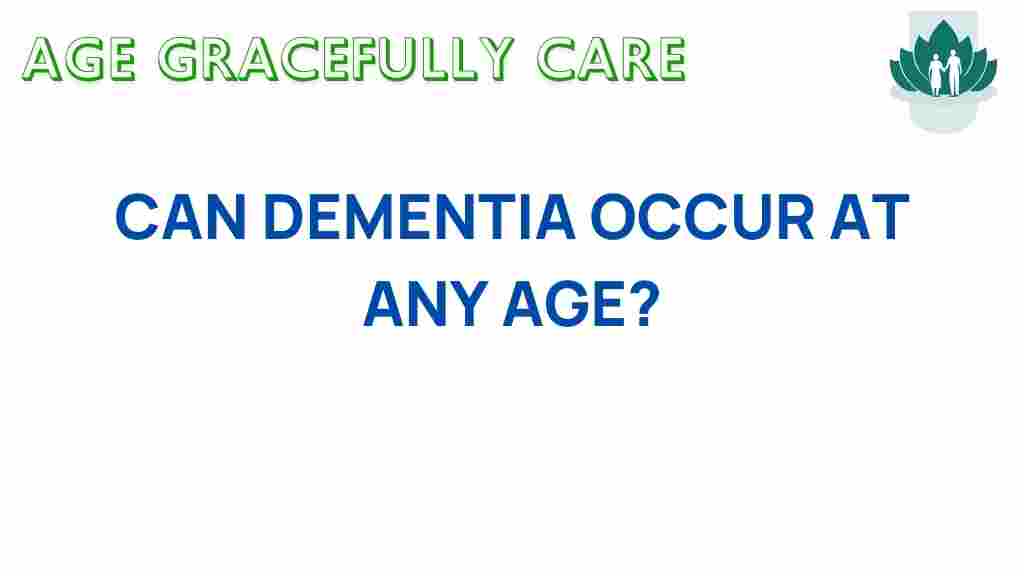Unraveling Dementia: Can It Strike at Any Age?
Dementia is a term that encompasses a range of neurodegenerative disorders characterized by a decline in cognitive function severe enough to interfere with daily life. While many associate dementia with old age, it is a misconception that it only affects the elderly. In this article, we will explore the various aspects of dementia, including its symptoms, risk factors, and the possibility of early onset. We will also discuss the importance of awareness, treatment options, and maintaining brain health.
Understanding Dementia
Dementia is not a specific disease but a general term for a decline in mental ability. It is caused by various neurological conditions, with Alzheimer’s disease being the most common form. Understanding dementia requires an examination of the symptoms, risk factors, and the effects it has across different age groups.
Symptoms of Dementia
The symptoms of dementia can vary significantly depending on the underlying cause, but some common signs include:
- Memory loss, particularly short-term memory
- Difficulty in communicating or finding words
- Challenges in problem-solving or planning
- Disorientation to time and place
- Changes in mood or behavior
- Withdrawal from social activities
As the disease progresses, these symptoms can worsen, impacting not only the individual but also their families and caregivers.
Can Dementia Strike at Any Age?
Yes, dementia can strike at any age, although the risk increases significantly as one gets older. Early onset dementia, which occurs in individuals under the age of 65, accounts for a small percentage of dementia cases but is becoming increasingly recognized. Early onset can present unique challenges, as younger individuals may be working and raising families, all while coping with the effects of dementia.
Risk Factors for Dementia
Several risk factors can contribute to the development of dementia. While age is the most significant risk factor, others include:
- Genetics: A family history of dementia can increase risk.
- Cardiovascular health: Conditions such as high blood pressure, diabetes, and high cholesterol can elevate risk.
- Brain injuries: Previous head traumas may lead to an increased risk of neurodegenerative diseases.
- Lifestyle factors: Poor diet, lack of exercise, smoking, and excessive alcohol consumption can negatively impact brain health.
- Social engagement: Lack of social interaction and mental stimulation can contribute to cognitive decline.
Understanding these risk factors is crucial for awareness and prevention efforts.
Awareness and Early Detection
Increasing awareness about dementia is essential for early detection and intervention. Recognizing the symptoms early can lead to earlier diagnosis and treatment, potentially slowing the progression of the disease. Here are steps to promote awareness:
- Education: Share information about dementia with family, friends, and community members.
- Screening: Encourage regular cognitive assessments for individuals at risk.
- Support groups: Join or facilitate support groups for individuals affected by dementia.
Early detection allows for planning and support, which can significantly improve the quality of life for those affected.
Treatment Options for Dementia
While there is currently no cure for dementia, various treatments can help manage symptoms and improve quality of life. These include:
- Medications: Drugs such as cholinesterase inhibitors can help with memory and cognitive function.
- Therapies: Cognitive behavioral therapy, occupational therapy, and speech therapy can assist in managing symptoms.
- Lifestyle changes: Encouraging a healthy diet, regular exercise, and engaging in mentally stimulating activities can support brain health.
It is essential to work closely with healthcare professionals to determine the best treatment plan for individuals with dementia.
Maintaining Brain Health
Maintaining brain health is critical in reducing the risk of dementia. Here are some strategies to promote brain health:
- Healthy diet: Incorporate foods rich in antioxidants, healthy fats, and vitamins.
- Regular exercise: Physical activity has been shown to improve cognitive function.
- Mental stimulation: Engage in puzzles, reading, and learning new skills.
- Social interaction: Stay connected with friends and family to foster emotional well-being.
By adopting these habits, individuals can enhance their brain health and potentially decrease their risk of developing dementia.
Research and Future Directions
Ongoing research into dementia is vital for understanding its causes and developing effective treatments. Current studies focus on:
- Genetics: Exploring the genetic factors that contribute to dementia.
- Biomarkers: Identifying early markers of dementia for earlier diagnosis.
- New treatments: Developing innovative therapies to slow disease progression and improve quality of life.
Staying informed about the latest research can empower individuals and families dealing with dementia. For more information on cutting-edge research, visit Alzheimer’s Association Research.
Troubleshooting Tips for Caregivers
Caring for someone with dementia can be incredibly challenging. Here are some troubleshooting tips to assist caregivers:
- Establish a routine: A consistent schedule can provide comfort and stability for individuals with dementia.
- Communicate clearly: Use simple language and maintain eye contact to enhance understanding.
- Be patient: Allow extra time for responses and avoid rushing the individual.
- Seek support: Don’t hesitate to ask for help from family, friends, or professional caregivers.
Remember, taking care of yourself as a caregiver is equally important.
Conclusion
Dementia is a complex and multifaceted condition that can affect individuals at any age. Understanding the symptoms, risk factors, and treatment options is vital for raising awareness and promoting brain health. As research continues to advance, there is hope for improved therapies and prevention strategies. By staying informed and proactive, we can better support individuals living with dementia and their families.
For more information on dementia and resources available for support, please visit National Institute on Aging.
This article is in the category Health and created by AgeGracefullyCare Team
